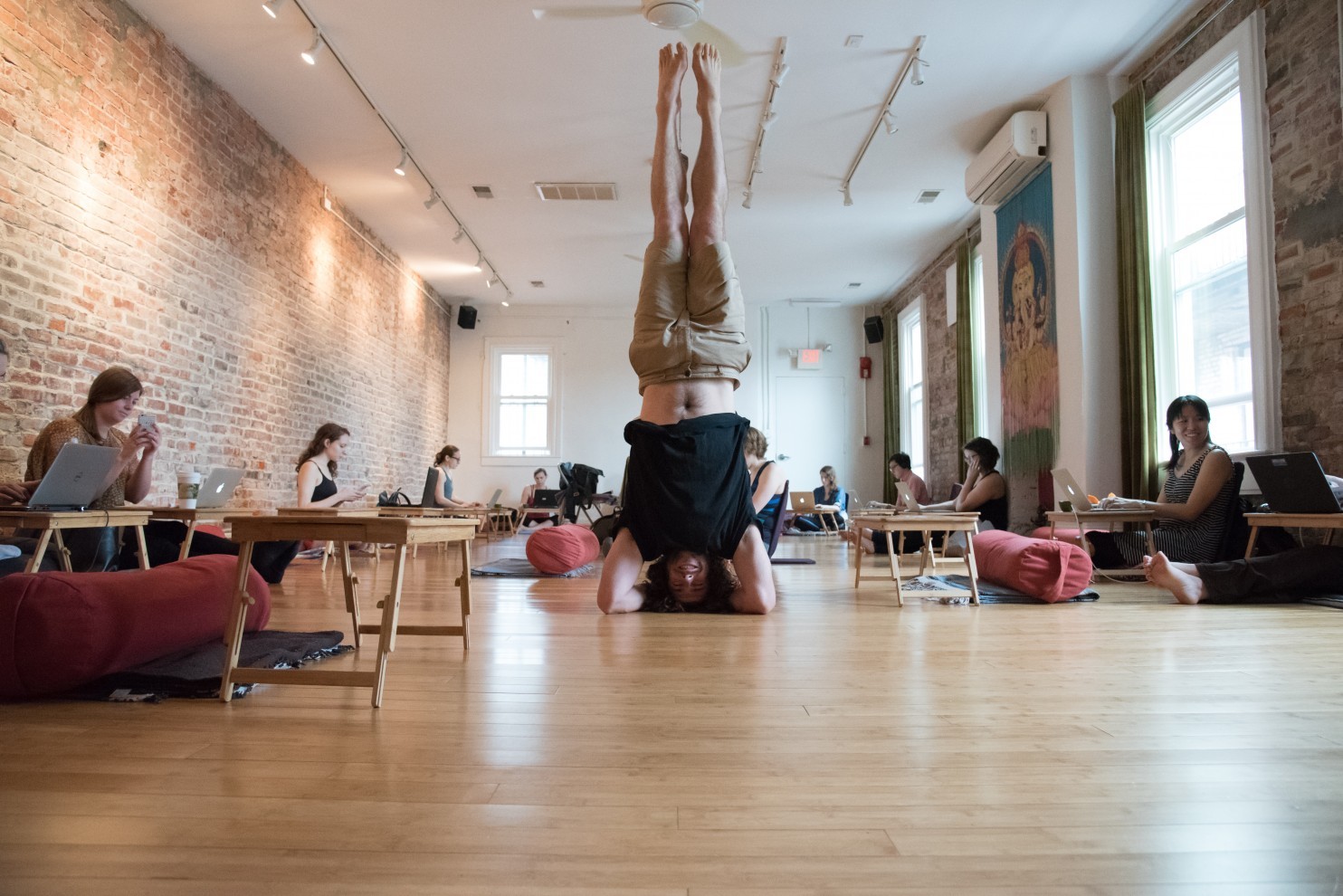
At 12:15 p.m. on a recent Wednesday, about 20 people settled into reclined positions on their yoga mats, leaning against bolsters. With their knees open, the soles of their feet pressed together and their hands resting on their stomachs, the group took some deep breaths before moving into poses such as cat-cow and downward-facing dog. The movements were designed to counter the tightness in their necks, shoulders, hips and backs from hunching over a desk.
Forty-five minutes later, they went back to work — most of them upstairs in a yoga studio turned shared workspace.
They’re members of WorkFlow, a month-old program at Flow Yoga Center (1450 P St. NW; flowyogacenter.com/workflow) that provides an alternative work environment from 9:30 a.m. to 4 p.m. Monday through Friday, including standing desks, reclining workstations and scheduled meditation and yoga breaks — oh, and WiFi. A monthly membership costs $90, or $70 if you already have a class pass.
And now they can work in pretty much any spot they want at the studio, whether it’s on a padded bench in the tea lounge, where organic teas and coffee are available, or in a quieter location. In a second-floor room that can hold 20 workers, about 10 sat or stood, the only sound coming from the clickety-clack of their fingers on their keyboards.
One of those workers was David Zlotnick, a lawyer and training coordinator at the Federal Energy Regulatory Commission. His telework agreement lets him make use of WorkFlow frequently. He finds working outside the office more productive.
“It’s a yoga studio. It has a very calming, peaceful, mindful vibe,” Zlotnick said.
WorkFlow comes as federal telework policies and flexible work schedules across business sectors have created a market for shared workspaces — and changed what a workspace looks like.
“There are many different definitions of workplaces,” said Ron Goetzel, senior scientist at Johns Hopkins University’s Bloomberg School of Public Health. Now “some of the factors that are as important as the physical space are climate, the culture of the organization, whether people enjoy being there. . . . Work is a marathon, it’s not a sprint. You really have to be there for a long period of time, and to do that, you have to take care of yourself.”
Although companies benefit from wellness programs — studies show that companies save $3 for every $1 they invest in health programs — places that offer co-working can’t reap the same rewards. Still, the return on investment comes in other ways, such as retaining members.
The meditations are guided and vary in type — mindful meditation, breath work and yoga nidra, or yogic sleep, for instance — based on what the group needs that day. “The other day, we subbed out our meditation break for a handstand break instead, because inversions are better than coffee. Sometimes you just need to do upside down, shake up your perspective and then get back to work,” said Catherine Zack, the center’s wellness director.
 Shared workspaces company MakeOffices, which has five local locations (including one in Tysons Corner, shown) and two coming soon, made health a priority this year in an effort to differentiate itself from competitors. (MakeOffices)
Shared workspaces company MakeOffices, which has five local locations (including one in Tysons Corner, shown) and two coming soon, made health a priority this year in an effort to differentiate itself from competitors. (MakeOffices)Initially, Flow co-founder Debra Mishalove hesitated to use the space for work. “It’s really important for us to create a space for people to let go of that and do yoga,” she said. But the building was sitting vacant most of the day .
“We had this beautiful building here on P Street, next to the Whole Foods and Logan Circle, that’s like Grand Central Station in the early morning, evening and weekends but during the day wasn’t getting utilized,” Zack said. “We thought the answer is probably not more yoga classes. What are people doing during the hours of 9 to 5? They’re working.”
Shared workspaces company MakeOffices, which has five local locations and two coming soon, made health a priority this year in an effort to differentiate itself from competitors, said Shana Glenzer, its chief marketing officer. The company provides fruit, massage therapists, relaxation rooms with massage chairs and on-site fitness center access, and it plans networking and social events — all as part of the month-to-month leases, which start at $550 for private offices and $250 for open desks. As a result, the company is equal parts workspace provider, personal assistant and party planner.
“It’s just more comfortable, more relaxed” than a regular office building, said Kiran Uppin, chief operating officer at ASAP Firewatch, which leases space at the Tysons Corner MakeOffices (1751 Pinnacle Dr., McLean; makeoffices.com/locations/tysons). “A relaxed environment definitely makes you do better work.”
It also helps attract employees. “The traditional work environment of 9 to 5 and sitting in traffic is not really one that’s conducive” to the lifestyle that people want, said Chris Seguinot, chief executive of ASAP Firewatch. “You have to look at other ways to retain talented people and put them in an environment they enjoy and in which they thrive.”
Whether it’s building meditation and yoga into the workday or providing a quiet room for a massage, full-service workspaces aim to make sure work isn’t the only focus, but when it is, it’s laser-sharp.
“We can juice ourselves up and have a deadline and slam out the work, but there’s another way to work in which you’re taking care of yourself while you work, and that’s what I think the beauty of this experience is,” Zlotnick said of WorkFlow. “When I leave here at the end of the day, I feel satisfied and productive and much less exhausted than I would if I had gotten the same amount of work done in my office.”
From: The Washington Post
